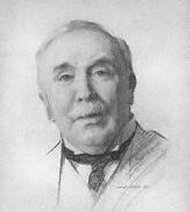 | |
| Term of Office: | 5 December, 1905 - 3 April, 1908 |
| PM Predecessor: | Arthur James Balfour |
| PM Successor: | Herbert Asquith |
| Date of Birth: | 9 July 1836 |
| Place of Birth: | Glasgow, Scotland |
| Political Party: | Liberal |
Sir Henry Campbell-Bannerman (July 9,1836 - April 22,1908) was a British Liberal politician who served as Prime Minister from December 5 1905 until resigning due to ill health on April 3 1908.
Campbell-Bannerman was born in Glasgow in 1836 as "Henry Campbell". In 1868 he was elected to the House of Commons as a Liberal, and entered Gladstone's second cabinet as Chief Secretary for Ireland in 1884. In Gladstone's Third (1886) and Fourth (1892-1894) Cabinets and Rosebery's Government (1894-1895) he served as Secretary for War, where his most notable accomplishment was persuading the Duke of Cambridge, the Queen's cousin, and on obstacle to necessary army reforms, to resign as Commander-in-Chief. This earned Campbell-Bannerman a knighthood. In 1898 Sir Henry succeeded Sir William Vernon Harcourt as leader of the Liberals in the House of Commons. Campbell-Bannerman had a difficult job holding together the strongly divided party, and when the Liberals returned to power in 1905, he became Prime Minister.
Campbell-Bannerman's premiership was a frustrating one, as the Conservative Lords blocked most of the Liberals' reform measures, but it did see the achievement of an Entente with Russia in 1907 by his Foreign Secretary, Sir Edward Grey. In that same year, Campbell-Bannerman achieved the honour of becoming the Father of the House but his health took a turn for the worse, and he died early in 1908. He was succeeded as Prime Minister by his Chancellor of the Exchequer, Herbert Henry Asquith.
Sir Henry Campbell-Bannerman's Government, December 1905 - April 1908
- Sir Henry Campbell-Bannerman - Prime Minister and First Lord of the Treasury
- Lord Loreburn - Lord Chancellor
- Lord Houghton - Lord President of the Council
- Lord Ripon - Lord Privy Seal
- Herbert Henry Asquith - Chancellor of the Exchequer
- Herbert John Gladstone - Secretary of State for the Home Department
- Sir Edward Grey - Secretary of State for Foreign Affairs
- Lord Elgin - Secretary of State for the Colonies
- Richard Burdon Haldane - Secretary of State for War
- John Morley - Secretary of State for India
- Lord Tweedmouth - First Lord of the Admiralty
- David Lloyd George - President of the Board of Trade
- Sir Henry Hartley Fowler - Chancellor of the Duchy of Lancaster
- Sir John Sinclair - Secretary for Scotland
- James Bryce - Chief Secretary for Ireland
- John Burns - President of the Local Government Board
- Lord Carrington - President of the Board of Agriculture
- Augustine Birrell - President of the Board of Education
- Sydney Buxton - Postmaster-General
Changes
- January 1907 - Augustine Birrell succeeds Bryce as Irish Secretary. Reginald McKenna succeeds Birrell at the Board of Education.
- March 1907 - Lewis Vernon Harcourt, the First Commissioner of Public Works, enters the Cabinet.
| Preceded by: Arthur James Balfour 1902-1905 |
Prime Minister of the United Kingdom 1905-1908 |
Followed by: Herbert Asquith 1908-1916 |
| Preceded by: Sir William Vernon Harcourt |
Leaders of the Liberal Party | Followed by: Herbert Henry Asquith |